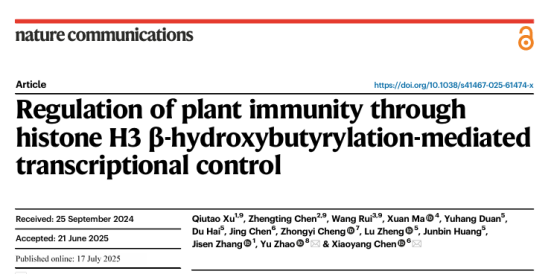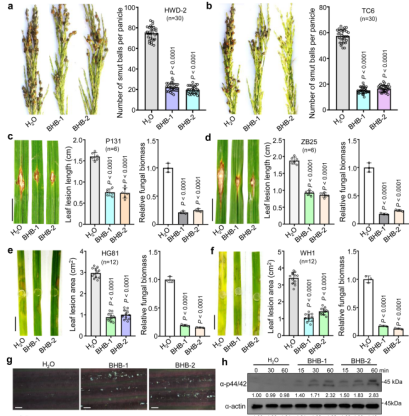Recently, the research team led by Professor Xu Qiutao from the College of Agriculture at Guangxi University published a paper titled "Regulation of Plant Immunity Through Histone H3K9bhb-Mediated Transcriptional Control" in the internationally renowned journal Nature Communications. The study reveals that β-hydroxybutyrylation modification at the histone H3K9 site (H3K9bhb) enhances disease resistance in rice against multiple fungal and bacterial pathogens by promoting the expression of defense-related genes. This work not only uncovers for the first time a novel mechanism of metabolite-mediated epigenetic regulation in plant immunity but also provides an important theoretical foundation and potential targets for molecular breeding of disease-resistant crops and the development of environmentally friendly green pesticides. Guangxi University is the primary affiliation of this study.

Rice diseases cause an annual grain yield loss of 10%–30% in China, posing a serious threat to national food security. Therefore, it is of great strategic significance to deeply explore immune regulatory factors in rice, elucidate their molecular disease resistance mechanisms, and develop new rice germplasm with both high yield and high resistance to ensure food security. This study found that β-hydroxybutyric acid significantly enhances rice resistance to diseases such as rice blast and false smut by mediating histone H3K9bhb modification, which activates the expression of immune-related genes. Meanwhile, the histone deacylase HDA705 was identified to participate in the disease resistance process by regulating this modification.

It is reported that this research has received support from the Guangxi Outstanding Youth Science Fund, the National Natural Science Foundation of China, and the Guangxi University High-Level Talent Program. In recent years, Professor Xu Qiutao's research team has focused on plant epigenetics, a cutting-edge field in biology, with their work centered on the identification of novel epigenetic modifications and the elucidation of their functional mechanisms. A series of important original researches have been published in renowned international journals such as Nature Communications, Molecular Plant, Cell Reports, Nucleic Acids Research, Genome Biology, Plant Biotechnology Journal, and Plant Communications.